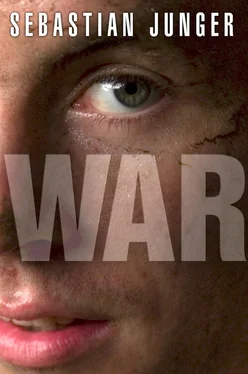“HOW MANY ROUNDS YOU GOT?”
“HE’S IN THE DRAW!”
We’re getting hit from the east and the south and the west and the guy to the west is putting rounds straight through the position. They’ve got another guy below us in the draw and Olson is trying to deal with that but the SAW won’t angle low enough to hit him. “TOUGH LOVE!” one man shouts; I’m pretty sure another starts singing. My brain has sought refuge in some slow-motion default that doesn’t allow for much decision-making, but after half a minute things regain their normal speed and I’m able to follow Kim as he sprints for the front gate. We stick close to the Hescos because incoming rounds are still doing their nasty thing to the air above our heads. Kim and Rudy lean out from the last Hesco, one high one low, shooting into the draw until Rice walks up with a sour expression on his face and unloads three or four bursts from his SAW. Rice is the head of Weapons Squad and once described himself to me as “one of those goofy guys who just loves combat.” After he’s done with the SAW he calls for a 203 and Kim hands him a loaded tube and he steps into the open and shoots one down into the draw. He turns away and steps back behind the Hescos before it has even exploded. The gunfire dies down except for the sound of mortars hitting the ridge. Whoever was shooting at us is either dead or out of ammo.
Gutierrez suffered complete fractures of both the tibia and fibula, offsetting his foot from his leg so badly that I found it hard to even look in his direction. He and a Third Squad PFC named Moreno were up on the Hescos dumping ammo cans of dirt when they were targeted by a Taliban gunner on the ridge. O’Byrne says that bullets sound like a rubber band being snapped against plastic when they pass close to you, and that’s the sound both men heard all around them before throwing themselves off the Hesco. Moreno landed fine but Guttie caught a foot on the way down and hit with the full weight of his body plus thirty pounds of protective gear.
Moreno put his hands on him and started to pull him out of the gunfire. A Third Squad team leader named Hijar ran forward to help, and he and Moreno managed to drag Guttie behind cover before anyone got hit. By that time the medic, Doc Old, had gotten to them and was kneeling in the dirt trying to figure out how badly Guttie was hurt. Later I asked Hijar whether he had felt any hesitation before running out there. ‘No,’ Hijar said, ‘he’d do that for me. Knowing that is the only thing that makes any of this possible.’
That’s my memory of what he said, at any rate; I was still too amped to write anything down. It was our third firefight of the day and there was no reason to think they were done with us yet. Rice sends First Squad out to clear the draw but they come back without making contact and now they’re busy reinforcing the position at the front gate with sandbags. Guttie’s on his back in the bunker while Doc Old slides a needle into his arm. Guttie already has an IV drip in his arm, a cigarette in one side of his mouth, a fentanyl lollipop in the other side, and he’s listening to music on his iPod. A moment later the morphine hits.
“Even my neighborhood dealer had better shit than this,” Guttie says.
A soldier named Stichter walks past. He’s a tall, good-looking kid from Iowa who has “INFIDEL” tattooed across his chest and keeps a photo of his sister inside his helmet. (That way, he says, she’s the last thing he sees before going out on patrol.) He looks down at Guttie and shakes his head. “Personally, I find it funny that an airborne-qualified soldier jumps five feet and breaks his ankle,” he says.
The workday is over and the men start to gather in the bunker, joking and reading magazines and sneaking glances at Guttie. He’s lying on a stretcher listening to music with his hands clasped across his chest and a beatific look on his face. He’s not even here. I’m sitting on a cot next to Jones, the only black guy in the platoon and one of five in the entire company. He’s from Reno, Nevada, but lived in Colorado for a while, where he says he had the highest PT score in the state. He benched 385 and burned the forty in 4.36 seconds. An athletic scholarship to the state university fell through and he wound up selling drugs in Reno before joining the Army to avoid getting killed or doing time. “I’d been shot at plenty back in the civilian world, so I already knew how I’d react under fire,” he told me. “I mean I ain’t stupid — I’ll take cover — but there ain’t no bitch in me, either.”
Now he’s morosely smoking a cigarette while other men joke and chatter around him. Solowski is flipping through a surfing magazine. Kim is in the bunker reading a Harry Potter book. The sun sits low in the west and has laid planks of light across the valley from the western ridges to the dark slopes of the Abas Ghar. I can hear animals — wolves? monkeys? — yapping from the crags above us. Patterson takes a radio call from headquarters and learns that Prophet has overheard the enemy talking about twenty hand grenades in the valley. Rice is standing next to him and says something quietly about Ranch House. “I know,” Patterson answers. He walks out of the bunker and repeats the news to the men. No one responds.
“Those are for us,” Jones finally mutters. The tip of his cigarette wobbles in the darkness as he speaks. “You don’t get grenades to throw three hundred meters. They’re going to try to breach this motherfucker.”
I was to spend weeks at a time up on that hilltop, and it soon became clear that if I were to get killed over the course of the next year, Restrepo was almost certainly the place it would happen. It wasn’t likely but it was possible, so I had the strange experience of knowing the location of my fate in advance. That made Restrepo an easy focus for all my fears, a place where the unimaginable had to be considered in detail. Once while leaning against some sandbags I was surprised to feel some dirt fly into my face. It didn’t make any sense until I heard the gunshots a second later. How close was that round? Six inches? A foot? When the implications of that kind of thing finally sink in you start studying the place a little more carefully: the crows that ride the thermals off the back side of the ridge, the holly oaks shot to pieces first by the Americans and then by the enemy, and the C-wire and the sandbags and shantytown hooches clinging to the hillsides. It certainly isn’t beautiful up there, but the fact that it might be the last place you’ll ever see does give it a kind of glow.
For some reason my worry about dying took the form of planning the attack that would kill me — kill us all — in the most minute detail. Some of the men thought the place was impregnable, but I had other ideas. You’d want to hit Restrepo at four in the morning, I decided, while everyone was asleep or groggy from sleeping pills. (They took them to keep from jerking awake at night from imaginary gunfire.) First you’d hit the south-facing guard tower and take out the Mark 19, a belt-fed grenade machine gun that could stop almost any assault in its tracks. After that you’d rake the gun ports with small-arms fire from the south and west and send successive waves of men up the draw. The first wave would absorb the Claymores and the second probably wouldn’t make it either, but by the third or fourth, you’d be inside the wire fighting hooch to hooch.
“It would start with RPGs and seventy-five to a hundred guys rushing the wire,” Jones said when I asked him how it would go down. “And they don’t take prisoners. The guys are killed next to you, you got to defend to the last man because nobody’s gonna help you. The KOP is a thousand meters away but it might as well be in a different country because they’re not getting to you. So you’d either have to make up your mind to fight until you die, or you’d just say, ‘Okay, everyone is dead around me, I’m just gonna go, I’m just gonna leave this place.’ And the problem is that all these weapons can be moved, we can set up the .50 and light up the KOP. Then you’ve got problems in the whole valley. And if they overran it they’re gonna kill soldiers, so there’s still gonna be bodies of soldiers up here. You wouldn’t be able to recover those bodies if you dropped a bomb on it. For them to fully overrun us? It would definitely be a bad day.”
Читать дальше
Конец ознакомительного отрывка
Купить книгу












